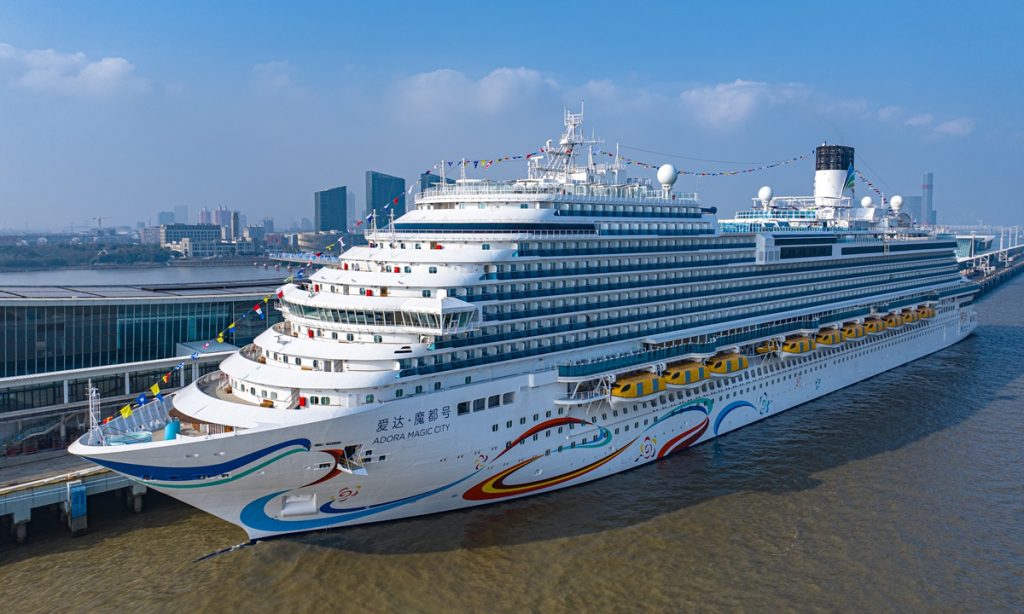Amazing moments of China’s ‘great power’ in 2023

In 2023, China witnessed remarkable achievements in scientific and technology area despite of comprehensive competition pressure and unreasonable containment from the US-led West. China's first domestically made passenger plane C919 takes maiden commercial flight; China's first domestic large cruise ship sets sail; China launches Shenzhou-17 manned spaceship for new challenging works; China's gigantic telescope builds world's largest neutral hydrogen catalog; and world's largest single capacity offshore wind turbine gets successfully installed… In the past year, China's technological innovation has achieved new breakthroughs, with each blockbuster project stunningly appearing.
In 2023, China's comprehensive ranking of innovation capability has risen to the 10th place, up three places from 2022 - the only developing country to enter the top 15, according to the National Innovation Index Report 2022-2023, released by the Chinese Academy of Science and Technology for Development (CASTED) on November 21, 2023.
The wonders of the sky are coming thick and fast in 2023. In 2023, China Space Station (CSS) entered a new phase of application and development, which will span more than 10 years, with the Tianzhou-6 cargo spacecraft, Shenzhou-16 manned spacecraft, and Shenzhou-17 manned spacecraft successively launched.
The launch of the Shenzhou-17 manned spacecraft coincides with the 20th anniversary of China's first successful manned spaceflight mission. Over the past 20 years, China's manned space launch missions have witnessed 30 victories, from short-term stays to medium and long-term residencies, from in-cabin experiments to spacewalks. China's aerospace industry continues to take new strides in high-level technology.
The good news in aviation is also coming in. On May 28, 2023, C919, China's self-developed large passenger aircraft, completed its first commercial flight. It creates a milestone in China's aviation industry, which aims to compete with global players such as Boeing.
It is important proof of China's strength in self-innovation in the high-end manufacturing industry, and its solid market performance will foster further confidence in future orders and among customers, Chinese experts said.
Moreover, in December 2023, using the Five-hundred-meter Aperture Spherical Radio Telescope (FAST), or the "China Sky Eye," a team of Chinese astronomers built the largest-ever high-quality catalog of neutral hydrogen (HI) sources beyond our Galaxy.
Hydrogen, the most abundant element in the universe, is a key component of galaxies. Within disk galaxies, the HI is a significant component of the interstellar medium.
The measurement of its abundance and kinematics via the 21-centimeter emission line could potentially address a number of astrophysical issues, such as the possible properties of dark matter, faint unknown galaxies, as well as the cosmic structure and evolution, the Xinhua News Agency reported.
Miracles and breakthroughs are also happening at sea level across the year.
China's first domestically made large cruise ship, named Adora Magic City, left a port in Shanghai on January 1, 2024, for its commercial maiden voyage, a development that experts said marks a breakthrough for China's high-end manufacturing and international cooperation.
It enhances the international status of China's shipbuilding industry, injecting new vitality into China's cruise sector, and shows Chinese industry's open attitude in international cooperation, experts said.
It's the world's most complex single electromechanical vessel with more than 25 million parts, about five times the number of individual parts used in China's first domestic aircraft, the C919.
In more than three years of construction, the project team made three crucial tech breakthroughs, on weight control, vibration and noise reduction, and the vessel's safe return to port.
Also, China's first sea-spanning high-speed railway capable of a top speed of 350 kilometers per hour started service in East China's Fujian Province in late September. The line shortens the travel time between Fuzhou and Xiamen to at most 55 minutes in a bid to enhance the connectivity between the two major cities in the province.
The railway was designed using the latest modeling technology based on digital information, which realized the integrated management of high-speed railway's design, construction and operation.
The BeiDou Navigation Satellite System, intelligent robots and environmentally friendly materials were adopted to facilitate the construction of cross-sea bridges. An intelligent command and dispatch system is used to ensure trains stay on schedule and operate efficiently. A big data analysts system can monitor and report all potential weather disasters, ensuring the safe operation of each train on the route.
Last but not least, the experimental advanced superconducting tokamak (EAST), or the Chinese "artificial sun," achieved a steady-state high confinement plasma operation for 403 seconds on April 12, 2023, a key step toward the development of a fusion reactor.
The breakthrough, achieved after more than 120,000 attempts, greatly improved the original world record of 101 seconds, which was set by EAST in 2017.
The ultimate goal of EAST, located at the Institute of Plasma Physics under the Chinese Academy of Sciences (ASIPP) in Hefei, is to create nuclear fusion like the sun, using substances abundant in the sea to provide a steady stream of clean energy.
Looking back at 2023, the breakthroughs in the field of science and technology forged new drivers and advantages for future development. It represents the Chinese wisdom that China contributes to the future development of humanity. China is also proving to the world that it is capable and confident in bringing more discoveries and breakthroughs to the world in 2024.